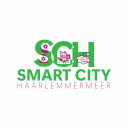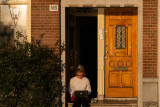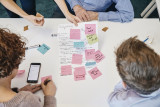Stay in the know on all smart updates of your favorite topics.
Smart City Haarlemmermeer - Digital Society School project

In large and diverse public organizations like the Gemeente Haarlemmermeer, communication can sometimes be hindered by silos. Different departments or teams in the organization may work independently leading to a lack of information sharing and coordination. With so many channels and platforms available, it can be difficult to filter out the information that is relevant and important to employees. This can lead to information overload and make it difficult for employees to stay updated on important updates.
Thus, the trainee team from the Digital Transformation Traineeship Programme at Digital Society School embarked on a challenge on how Gemeente Haarlemmermeer can be facilitated to become a smarter, more connected, transparent and digitally inclusive organisation.
Read more about the project on the website of Digital Society School!
Responsible digitalisation challenge: How to make digital systems more human-centric?

Technological and innovative developments are moving faster than ever before. As a government, you want and need to keep up with these developments. At the same time, the use of digitalisation and data often leads to undesired results, increasing the distance between citizens/entrepreneurs and the government.
The municipality of Haarlemmermeer is shifting her focus from 'the system is central, people have to become more digitally savvy to 'people are central, our systems have to become human-centric’. The underlying question is: how do you really put people at the centre of digitalisation and the design of digital systems?
Do you want to know more or contribute to this challenge? Contact me via sophie@amsterdamsmartcity.com or let me know via the comments below.
Project’s current phase
Jeroen Brink and Christine Groothuis from the municipality of Haarlemmermeer introduced this challenge to the Amsterdam Smart City network on the 7th of November, 2022. During a co-creation session, we discussed that there are two main elements of this complex challenge that we would like to focus on. On the one hand, we’re talking about a radical and fundamental shift. A different way of thinking within governmental institutions. This shift requires a more philosophical and substantive conversation about how we would like our digital public space and systems to look like. But on the other hand, we want to think big but also start small. Therefore, the municipality of Haarlemmermeer would like to embrace a real-life case to bring human-centred digital systems to life.
On the 1st of December, we organised a follow-up session with Amsterdam Smart City partners. During this session, Max Kortlander (Waag) presented the Public Stack. This project puts the public value at the centre to create open, democratic and sustainable digital public spaces. Following this introduction, we did a futures-thinking exercise led by Sacha van Tongeren (Kennisland), to think about how we want the digital public space to look like in the future. And additionally, we used empathy maps to synthesize our collective knowledge about our audience, which brought us closer to a common understanding of who they are.
The 100 Intelligent Cities Challenge

The 100 Intelligent Cities Challenge (ICC) is a European Commission initiative that supports 136 cities in using cutting-edge technologies to lead the intelligent, green and socially responsible recovery. The ICC cities and their local ecosystems will be engines for the recovery of their local economy, create new jobs, and strengthen citizen participation and wellbeing.
The ICC is part of a wider EU support system that recognises the importance of delivering on the promises made by the European Green Deal, the digital strategy, and other EU policies. It looks to move towards a more digital, service-oriented and low-carbon economy, supported by a knowledge-based society, that enables circular economy systems through ‘local value loops’, evidence-based reskilling, and sustainable investments.
Participating cities receive one-to-one strategic advice from international experts on fine thematic strands: green economy and local green deals, improving the citizen participation and the digitalisation of public administration, green and digital transition in tourism, resilience of local supply chains, up- and reskilling of the workforce. ICC Cities are also supported by transversal services on access to data, access to finance and through a marketplace full of innovative solutions.
The Amsterdam Region, represented by Amsterdam Economic Board and Amsterdam Smart City (ASC) is one of the ICC mentor regions, alongside European mentor cities Aarhus, Antwerp, Barcelona, Espoo, Hamburg, Nice, Porto, Rijeka and international mentors Medellin, Singapore and Toronto. By participating in the ICC, the Amsterdam Region will share its experience and learn from other best practices related to multi-stakeholder collaboration, innovation ecosystems, circular economy and citizen participation.
ICC Updates:
• Launch of 100 Intelligent Cities Challenge
• ICC Challenge Mayors’ Summit
• Launch of ICC Renovation Action Group
• Public Kick-off 2nd ICC City Lab
• ICC - 3rd City Lab
• 200 Intelligent & Climate Neutral Cities Jam
• ICC - 4th City Lab
• Invitation to co-create European transition pathways for more resilient, greener and digital industrial ecosystems
• ICC - 5th City Lab
• Developing circular and sharing economy practices in cities
• The 100 Intelligent Cities Challenge: Looking Back & Looking Forward (End of Phase 1)
Responsible Sensing Lab

Smart city systems can help solve urban challenges. But when collecting data, what public values are involved? The Responsible Sensing Lab explores how to integrate social values such as autonomy, privacy, transparency, inclusiveness and empowerment in the design of sensing systems in public space.
In January 2021 the Responsible Sensing Lab was officially launched during an interactive livestream event. In essence the Lab is a testbed for conducting rigorous, transparent, and replicable research on how our smart technologies placed in public space can be designed in a way that makes the smart city ‘responsible’. Responsible Sensing Lab is a collaboration between the City of Amsterdam and AMS Institute.
A lab for a ‘responsible’ smart city
The City of Amsterdam has many smart technologies in place: from smart devices that measure things (i.e. sensors) to smart devices that steer processes in the city (i.e. actuators) such as traffic lights, charging stations, adaptable street lights, barriers that go up and down, and adaptive digital signs.
At the Responsible Sensing Lab we research, develop and integrate smart technologies like the aforementioned to help solve urban challenges. At the same time, we explore how to embed society’s public and democratic values in the design of these innovations.
(Re)designing, prototype testing and implementing responsible sensing systems
Within the Lab academics are invited to connect and work with practitioners who are responsible for digital systems in the city to (re)design, prototype and test (more) responsible ways of sensing in public space.
Hence, Responsible Sensing Lab is a place where teams of multi-disciplinary stakeholders – such as computer scientists, policy makers, psychologists, designers and hardware experts – can address existing hardware, software and other city sensing systems.
Core values
At the Responsible Sensing Lab, we use the City’s values (TADA, Digital City Agenda) as our starting point. We explore what these values mean when applied to actual software, hardware, user-experience design and governance.
Also, we are inspired by the methodology of value sensitive design. This approach allows us to focus on design choices inherent in the type of sensing hardware, the distribution of intelligence between cloud and back-end, the physical design and placement of sensors in public space, and interaction possibilities for citizens.
Do you want to know more or are you looking to collaborate? Contact us via our website!
Wicked Problems

Te wicked? Niet voor ons.
Wij werken allemaal aan urgente, complexe, maatschappelijke uitdagingen. Issues die schier onoplosbaar lijken, van dilemma’s en paradoxen omgeven, nog niet duidelijk hoe het moet. Wel is duidelijk dát het moet, dat we elkaar nodig
hebben en dat we er NU aan moeten beginnen. Om met de woorden van Jan Rotmans te spreken; we leven niet in een tijdperk van verandering maar in een verandering van tijdperk. En hier hoort een nieuwe gereedschapskist bij.
En of je nou aan energietransitie werkt, andere mobiliteitssystemen, creëren van waterstofhubs, peer to peer autodeelsystemen, het maakt niet uit, we zien dat al deze opgaven op enig moment tegen gelijksoortige barrières aanlopen. Op samenwerking, financiering, privacy, onvoldoende aansluiting op de maatschappij, om maar een paar voorbeelden te noemen.
Unieke samenwerking
Als Amsterdam Smart City netwerk willen en kunnen we deze opgaven niet laten liggen. Door het bundelen van onze kennis en expertise kunnen we als netwerk iets unieks bieden en de wil en durf tonen om deze barrières te doorbreken. De betrokken partners die dit uitdenken en begeleiden zijn RHDHV, Kennisland, Drift, NEMO, Arcadis, Alliander, HvA en Metabolic. Zij bundelen hun expertise en ervaring om de echte vragen boven tafel te krijgen, tot nieuwe manieren van samenwerken te komen en barrières te doorbreken. We richten ons met name op de start van de samenwerking. Gezamenlijk ontwikkelen we een ‘wicked problem aanpak’. Op een nieuwe manier, lerend door te doen, exploratief.
Waar moet je aan denken?
Wat is eigenlijk het echte probleem? Wiens probleem is dit? Hoe kijken anderen er tegenaan? Welke andere partijen lijken nodig? Hoe vind je ze? Hoe ga je om met eigenaarschap en botsende frames? Hoe zorg je dat je al in
een vroeg stadium de maatschappij (bewoners, ondernemers, werknemers, etc) betrekt en hun ervaringen in het project trekt? Het wicked problem team zet nieuwe methoden in voor het beantwoorden van deze vragen. En het creëren van de benodigde commitment om het vraagstuk aan te pakken. Niets staat van te voren vast, want we passen ons aan aan wat we tegenkomen. Met elkaar ontwikkelen we een nieuwe aanpak om de barrières te doorbreken.
Transition from Smart to Inclusive city

The primary objective of this research project is to enhance an understanding of the concept of inclusion and its criteria in Smart city discourse. The research ambition is applying the result as a tool for benchmarking inclusive smart cities, which can assess and improve them. To apply the result, we aim to work with cities like Amsterdam, The Hauge, and Rotterdam.
Stay up to date
Get notified about new updates, opportunities or events that match your interests.

